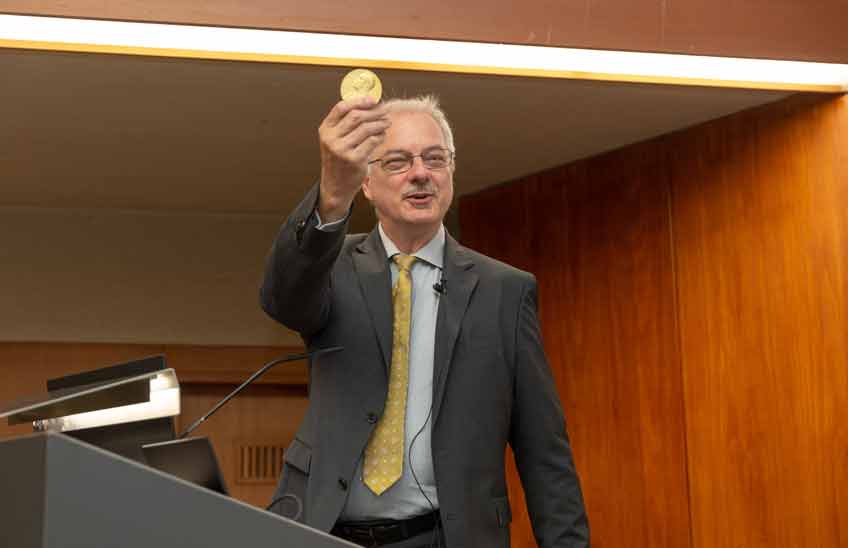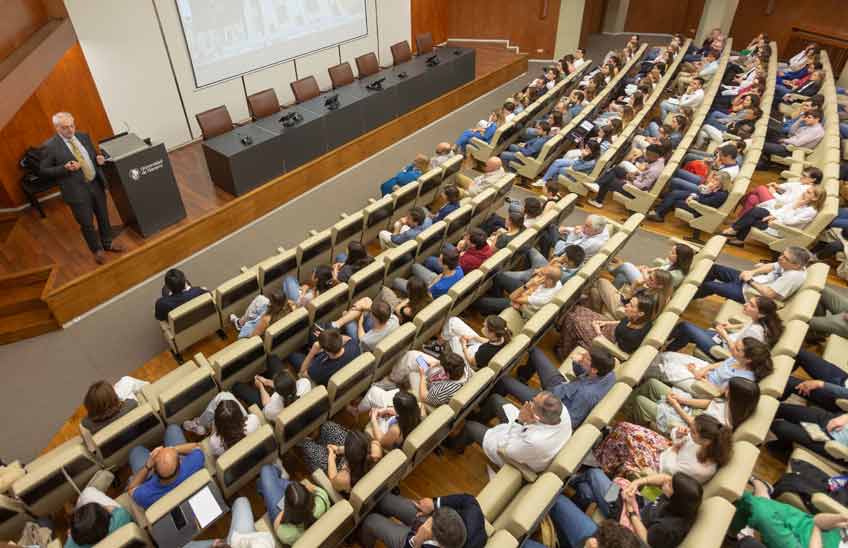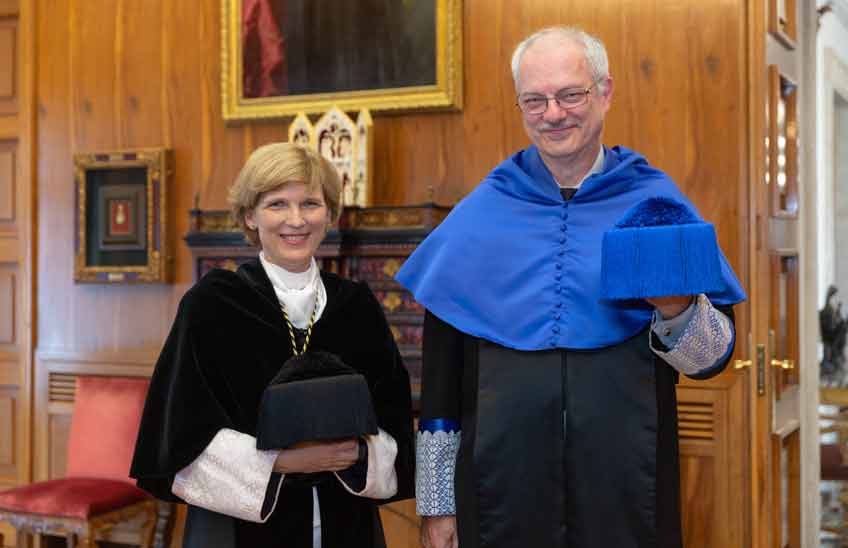"Teach Chemistry children in a visual and exciting way would help turn them into excellent college students."
The award Nobel of Chemistry 2022 Morten Meldal gave a masterclass on the "Chemistry click" to professors, researchers and students of the University, and participated in the investiture ceremony of new PhDs.

PhotoManuelCastells/Morten Meldal sample the gold medal he received in 2022 as a Nobel laureate for Chemistry
08 | 06 | 2023
"We have to implant Chemistry in the learning system of children and do it in a very visual way so that it excites them, practicing with experiments and using virtual reality tools. And it's so important because everything - you, me, what surrounds us, being hungry or falling in love - is Chemistry". Morten Meldal, award Nobel Prize winner for Chemistry 2022, was this enthusiastic and enthusiastic during the master class he gave to professors, researchers and students at the University of Navarra.
Since he was awarded the award in October last year, he confesses that the work has doubled: "Now I have two, the one from before, which continues to grow, and the one from being a Nobel Laureate". But thanks to this moonlighting he can devote time to the knowledge dissemination and promotion of the Chemistry. Hence, in addition to explaining the finding and operation of the "Chemistry click", for which he was awarded together with Barry Sharpless and Carolyn Bartozzi, the professor from the University of Copenhagen stressed the relevance of introducing the youngest to the basic notions of Chemistry, taking advantage of the way in which children acquire the knowledge. "If you think of happy moments in your childhood, you will see very clear images stored in your mind, because this is the way children learn. Something similar can happen with Chemistry: it is very visual and we have tools to get them to store those images, as they already do when they learn language or mathematics, so that they acquire from a young age a solid scientific foundation that will enable them to become excellent university students."
Meldal explained the training plan designed by several scientists and virtual animators, which covers all educational stages, from 5-minute pills per week for the youngest students to longer and more complex sessions in higher grades. "We have created a archive of materials for students and teachers, because we also have to help teachers teach. We want to put at their disposal an expert knowledge and very well worked materials for children and teachers to learn the Chemistry from day to day in the simplest way."

Balancing curiosity, funding and serendipity
During his speech, Meldal highlighted curiosity as one of the driving forces of any good researcher. "It is what should drive our whole work. We do not do research out of obligation, but because we are aware of the good that our activity generates and our wanting to know a little more."
In this line, he pointed to the relationship between funding and production as an effective way to pay for research and promote scientific progress. "In this way, researchers assume the penalty of not producing, so if after three years you haven't made any progress... you'd better do something else". In addition, he opted for the independence of experts, which would imply letting them decide at each moment where to lead their research, analyzing their development in recent years and assessing whether it is worthwhile for the future. "It would be much better and cheaper than how research is financed today," he said.
Likewise, the professor from the University of Copenhagen highlighted the component of uncertainty that throughout history has led to great discoveries such as penicillin or aspirin. "All discoveries have a part of serendipity, because if they were something obvious they would already have been made," he remarked. "Great discoveries are not made in offices, but arise in laboratories, first having an idea, doing creative experiments, carefully observing what happens... And almost always something strange, unusual, out of the ordinary happens, because nature is very complex."
A complete academic workshop
The Nobel of Chemistry 2022 visited the University invited by the professor of the School of Pharmacy and Nutrition Carlos Aydillo, who made his postdoctoral stay in Copenhagen, in the laboratory of Meldal. First thing in the morning he had a meeting with president María Iraburu and later he made a visit of campus accompanied by the board of the School.

After giving the keynote lecture "Molecular Click Adventures; a Leap from Shoulders of GiantsMolecular Click Adventures; a Leap from Shoulders of Giants"he held a colloquium with professors, researchers and students on the finding of the "Chemistry click". The academic workshop culminated with Morten Meldal's participation in the investiture ceremony of the PhDs who have defended the thesis last year, where he paraded in the academic dress of Science and the board of Governing Body of the University.
